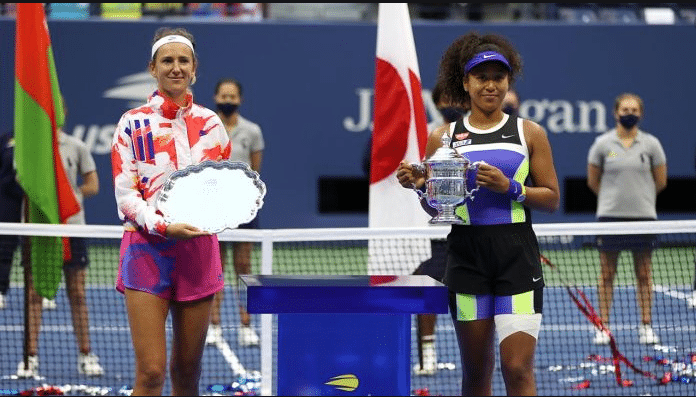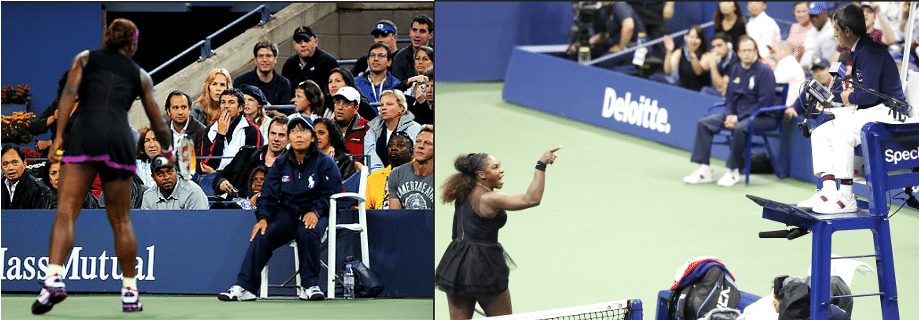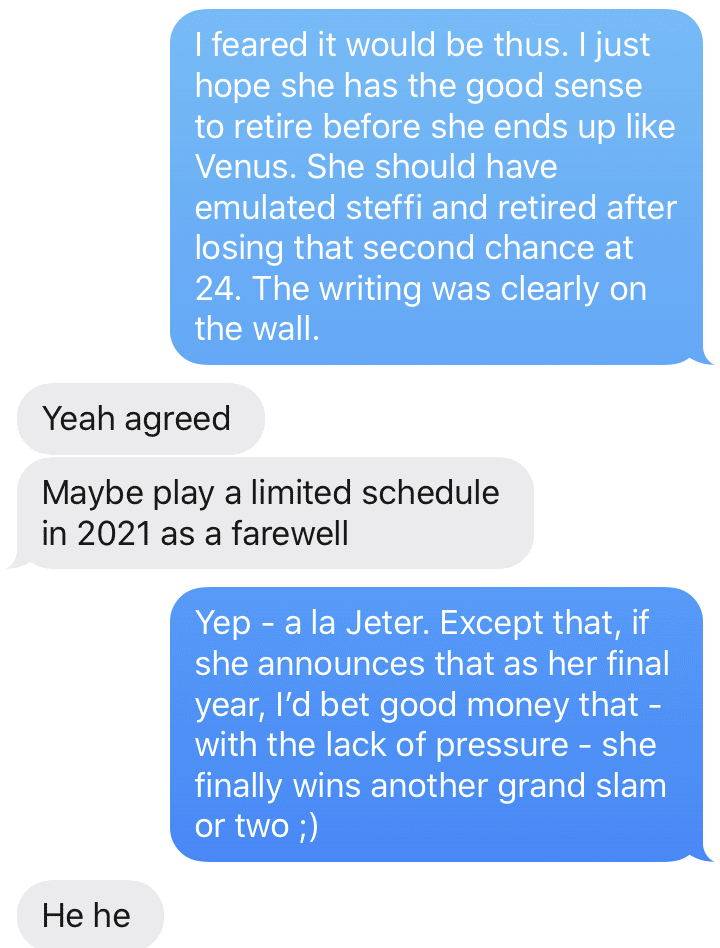Granted, it might be too soon to presume first-name-only recognition. So, for the uninitiated, I am referring to Naomi Osaka, the winner of last weekend’s Covid-defying US Open tennis tournament.
Naomi Osaka laid down in the middle of the court with her hands folded and stared at the sky. She had just won the US Open title — her second in three years and third overall major championship — against Victoria Azarenka. …
‘I was thinking about all the times I’ve watched the great players sort of collapse onto the ground and look up into the sky,’ she said. ‘I’ve always wanted to see what they saw.’
(ESPN, September 13, 2020)
So here’s to great players, of which Naomi is now one. In fact, I first hailed her as Serena’s heir apparent two years ago – after she won her first Grand Slam at this same tournament.
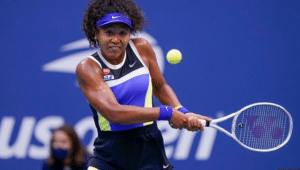 Many readers called me mad for asserting that Naomi would emulate Serena by dominating the game for the next two decades. I could hardly blame them. After all, she could easily have been just the latest one-slam wonder who would soon fade away; you know, like Francesca Schiavone, Ana Ivanovich, and Sloane Stephens.
Many readers called me mad for asserting that Naomi would emulate Serena by dominating the game for the next two decades. I could hardly blame them. After all, she could easily have been just the latest one-slam wonder who would soon fade away; you know, like Francesca Schiavone, Ana Ivanovich, and Sloane Stephens.
But nothing vindicates my coronation quite like Naomi being the only player to win 3 of the last 7 Grand Slams. No other player has even won 2. Alas, nothing indicates Serena’s fading glory quite like her failure to win any of those 7.
Ironically, Serena is winning more commercial endorsements than tennis tournaments these days. Because it’s easy to forget how she was complaining at the beginning of her career about pretty, no-talent white girls getting all those endorsements; here’s looking at you Anna Kournikova.
Indeed, this is a case where that Virginia Slims motto about the advancement of white women actually pertains to a black. And so I say to Serena: you’ve come a long way, baby.
In fact, thanks to Serena, Naomi is getting those commercial endorsements at the beginning of her career that Serena complained about not getting at the beginning of hers. And the proof is in the pudding, or in the bank account—as is more the case. Because a recent report in Forbes magazine revealed not only that Naomi is getting more in commercial endorsements than any other player on the tour, but that she’s earning more than any female athlete in the world. But I digress…
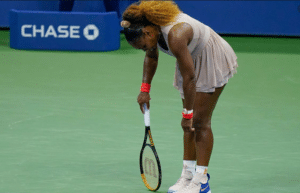 I should clarify that I am not saying Naomi will surpass Serena’s haul of 23 career Grand Slams. It’s just that Serena’s failure to surpass Margaret Court’s record-setting 24 has not precluded everyone from hailing her as the GOAT (i.e., the Ali-inspired boast of being greatest of all time).
I should clarify that I am not saying Naomi will surpass Serena’s haul of 23 career Grand Slams. It’s just that Serena’s failure to surpass Margaret Court’s record-setting 24 has not precluded everyone from hailing her as the GOAT (i.e., the Ali-inspired boast of being greatest of all time).
In a similar vein, Naomi’s failure to surpass Serena’s should not preclude anyone from hailing her as the new GOAT. The problem is that injuries might. Because, as was the case early in Serena’s career, injuries are causing Naomi to withdraw from tournaments. So it remains to be seen if she can recover and resume her dominance the way Serena always did.
For the record, Naomi rallied from 1 set down to defeat Victoria Azerenka in 3 — 1-6, 6-3, 6-3 — for this championship. It was a thrilling demonstration of not only her skill but her will.
All the same, I am especially impressed that Naomi seems determined to defy the (white) sensibilities that prevail in her sport. After all, with the notable exception of founder Billie Jean King, I’m sure the officers of the WTA would really like it if Naomi would just shut up about racial justice and play ball.
So kudos to her for being in the vanguard of professional athletes championing the BLM cause. Never mind this irony of ironies:
- Covid-19 protocols forced Naomi to keep her mouth shut on this the biggest of all international stages in women’s tennis.
Mind you, she was probably fine with this because she describes her voice as the most awkward in tennis. And, if you ever hear her timid, nasal, barely-audible, baby voice, you’ll agree.
As it happened, though, this only provided Naomi another opportunity to display her unconquerable will. Because she found what might have been an even more poignant way to champion this cause. She had the name of a martyred victim of police brutality emblazoned on the mask she wore for each of her seven matches.
This forced TV commentators and viewers around the world to do as BLM protesters continually demand: say their names: Breonna Taylor, Elijah McClain, Ahmaud Arbery, Trayvon Martin, George Floyd, Philando Castile, Tamir Rice.
But, given all that, I will be very disappointed if she fails to join the chorus of those calling out Tennis Australia. This, because it is refusing to remove Margaret Court’s name from one of the main stadiums before the next Australian Open Grand Slam tournament.
The shame, of course, is that Court is the holder of the record-setting 24 Grand Slams that Serena is so tantalizingly close to tying. But Court’s dogmatic homophobia, to say nothing of her pining for Apartheid South Africa, poses an untenable association that an influential player like Naomi should no longer abide.
Apropos of which, Serena has shown a little activism throughout her career too. The problem is that they often stemmed from her going ghetto on center court.
Perhaps you recall that infamous incident when she threatened to stuff a tennis ball down the f*cking throat of a lineswoman. This, because the woman dared to make a costly but accurate call against her. Or another when she accused the umpire of calling her a thief after he penalized her because her coach violated the rules by sending her signals during a match.
Serena framed those and other incidents as a black woman just speaking up for her rights. For what it’s worth, nobody is a bigger fan than I (well, with the possible exception of my old college roommate).
But even I, a proud black man, thought Serena was dead wrong in each case. I explained why and expressed my disappointment in “Serena Snaps; Kim Clijsters Triumphs at US Open,” September 15, 2009 and “US Open: Serena’s Upset with Umpire Overshadowed Naomi’s Upset of Her,” September 9, 2018.
It would have been one thing, for example, if the linesperson she snapped at were a big white man. But this was a petrified little Asian woman — who looked up at Serena as if she were a huge meteorite about to land on the poor woman’s head.
But that incident with the umpire brings me back to Naomi. Because it occurred when it was clearly dawning on her that Naomi was about to deny her last, best chance to win her record-tying 24th Grand Slam.
Incidentally, speaking of awkward, there’s no denying how awkward that incident was for everyone in the stadium, and even for those like me watching on TV. The wonder is that it did not rattle the young Naomi. She was, after all, trying to win her very first grand slam. Yet she held – not only her nerve, but her serve to win.
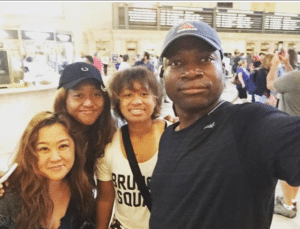 Finally, apropos of being black, like many readers who inquired, you too might be wondering if Naomi identifies as Black – her vanguard support for Black Lives Matter notwithstanding.
Finally, apropos of being black, like many readers who inquired, you too might be wondering if Naomi identifies as Black – her vanguard support for Black Lives Matter notwithstanding.
Her parents are Black Haitian Leonard Francois and Asian Japanese Tamaki Osaka. This is why she identifies as Black and Asian, which I suppose is one shade of race consciousness above Tiger Woods identifying as Cablanasian. Remember that…?
With respect to both of them, though, you need only query why the most famous bi-racial person in the world never identifies as Black and Caucasian. The reason, of course, is that Barack Obama knows that, from the days of slavery, whites have always treated bi-racial Americans as Black.
It has never mattered if that “Black” looked as white as white can be. More to the point, those bi-racial Blacks had to toil as slaves and suffer the indignities of Jim Crow right alongside their darker brothers and sisters. And, thanks to Trump’s presidency, some whites are doing their damndest to recapture those halcyon days when just one drop of Black blood meant you were as Black as Black can be.
This brings me to the other probing question Naomi’s racial identity poses, namely why is her last name Osaka and not Francois?
Naomi has lived in the United States since she was three years old, and holds dual US-Japanese citizenship. And reports are that her father has been as much a guiding force and paternal presence in her life as Serena’s was in hers.
But he insists that Naomi’s last name reflects nothing more than common sense:
- In homogeneous Japan, a biracial child stands a much better chance in life if she at least has a Japanese name.
- In competitive America, a tennis player stands a much better chance of securing funding for training if she competes under the flag of a less competitive country like Japan. This, even though, like so many foreign athletes, she trains exclusively in America.
So Game. Set. Match. The Osakas!
Epilogue on Serena.
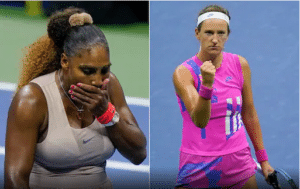 Since taking time off to have her baby, she has blown chances in four finals to win her 24th Grand Slam. Therefore, it had to be especially devastating that, despite Covid preventing some top players from even participating, she could not even make it back to the finals at this US Open.
Since taking time off to have her baby, she has blown chances in four finals to win her 24th Grand Slam. Therefore, it had to be especially devastating that, despite Covid preventing some top players from even participating, she could not even make it back to the finals at this US Open.
And I suspect that devastation was compounded by the fact that it was fellow mother Victoria Azarenka who knocked her out in the semis.
All of this moved me to text the following to my old college roommate – who I mentioned earlier:
[Note: I couldn’t have been less interested in the men’s side of this tournament. But I should at least acknowledge that Dominic Thiem of Austria rallied to beat Alexander Zverev of Germany in a fifth-set tiebreaker (2-6, 4-6, 6-4, 6-3, 7-6 (8-6) to win his first Grand Slam. Given that score, I’m sure it was a very exciting match indeed.]
Related commentaries:
Osaka… Serena going ghetto…
